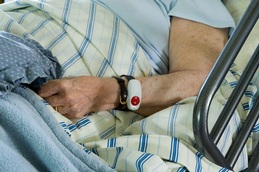Nursing survey raises 'profound' concerns about quality of care for those dying
Members of the Royal College of Nursing are concerned about the ability of health services to deliver high quality end-of-life care to the 500,000 of people who die every year in the UK.

In a recent survey of Royal College of Nursing (RCN) members, only 10.5 per cent said that they were always able to deliver the right level of care to such patients.
Nearly 60 per cent said that the wishes of patients could not be fulfilled during the last six months. When asked why those wishes could not be fulfilled, reasons given included a lack of time, with some also citing a lack of training.
A nurse said: “I believe care of the dying is a privilege but hospital settings are just so busy these days. A dying patient and their family needs nurses with experience to oversee them so they can get the best care.”
Only 36 per cent of nurses working in the community said that their team has the resources to deliver round the clock care to patients who have chosen to die at home.
Around 70 per cent of nurses in the community reported patients having to be taken into hospital in their final hours, against their wishes, because there weren’t the resources to care for them at home.
Dr Peter Carter, chief executive and general secretary of the RCN said: “This survey has touched a nerve among nursing staff. Hundreds have told us about the honour and privilege of caring for people at the end of their lives.
“However, many are also profoundly troubled by their experiences of trying to deliver care for the dying, against a backdrop of staff shortages, lack of resources, inadequate training, cost pressures and rising demand. “Sensitive nursing can make an enormous difference to the experience of a dying person and a ‘good death’ with expert care can also make the bereavement process much easier for the loved ones they leave behind.
“Nursing the dying is an art, as well as a science. It cannot be reduced to a process of drug administration or a series of required nursing tasks, however important these things are.”
More than half of those surveyed said that they treated people approaching the end of their life at least once a week, with many doing so on a daily basis. Despite this a quarter of nurses said that they had received no specific training, either before they qualified or since they had started work.
Dr Carter added: “The RCN is now beginning a large scale programme of work to establish what support nurses need to deliver the care they would like, and to play our part in making that support available.”
Latest News
 29-Jul-24
Dementia Bus gives carehome.co.uk staff insight into life with dementia
29-Jul-24
Dementia Bus gives carehome.co.uk staff insight into life with dementia
 01-Mar-24
Find out the top care homes in 2024
01-Mar-24
Find out the top care homes in 2024
 21-Mar-23
UK's top care homes in 2023 revealed
21-Mar-23
UK's top care homes in 2023 revealed
 03-Jan-23
carehome.co.uk launches free care helpline
03-Jan-23
carehome.co.uk launches free care helpline
 13-Dec-22
5 mins with Emily Whitehurst, chief operating officer for Constantia Healthcare
13-Dec-22
5 mins with Emily Whitehurst, chief operating officer for Constantia Healthcare